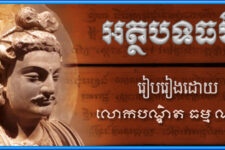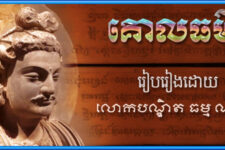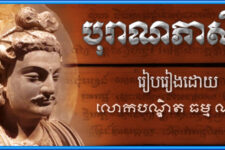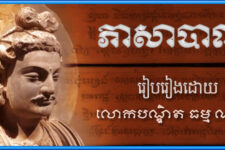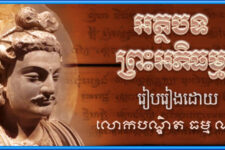ពុទ្ធវចនៈក្នុងធម្មបទ គាថាទី ១៧
អ្នកធ្វើអំពើអាក្រក់ តែងក្តៅក្រហាយជានិច្ច
THE EVIL-DOER LAMENTS HERE AND HEREAFTER
ဣဓ တပ္ပတိ ပေစ္စ တပ္ပတိ၊ ပာပကာရီ ဥဘယတ္ထ တပ္ပတိ။
‘‘ပာပံ မေ ကတ’’န္တိ တပ္ပတိ၊ ဘိယ္ယော တပ္ပတိ ဒုဂ္ဂတိံ ဂတော။ (តួអក្សរភូមា)
ឥធ តប្បតិ បេច្ច តប្បតិ, បាបការី ឧភយត្ថ តប្បតិ;
‘‘បាបំ មេ កត’’ន្តិ តប្បតិ, ភិយ្យោ តប្បតិ ទុគ្គតិំ គតោ។
បុគ្គលអ្នកធ្វើបាបកម្ម តែងក្តៅក្រហាយក្នុងលោកនេះនិងក្នុងលោកខាងមុខ តែងក្ដៅក្រហាយក្នុងលោកទាំងពីរ គេរមែងក្ដៅក្រហាយដោយគិតថាខ្លួនបានធ្វើបាបហើយ លុះធ្វើមរណកាលទៅកាន់ទុគ្គតិភព ក៏រឹងរឹតតែក្ដៅក្រហាយក្រៃលែង ។
Idha tappati pecca tappati, pāpakārī ubhayattha tappati;
‘‘Pāpaṃ me kata’’nti tappati, bhiyyo tappati duggatiṃ gato.
Here he suffers, hereafter he suffers. In both states the evil-doer suffers. “Evil have I done (thinking thus), he suffers. Furthermore, he suffers, having gone to a woeful state.
——————————————
Story: រឿងព្រះទេវទត្ត
The Venerable Devadatta made an unsuccessful attempt to kill the Buddha. In his old age he repented and desired to see the Buddha. While he was being carried on a litter to see the Buddha, he died on the way under tragic circumstance.
* Duggati is a woeful state and Sugati is a blissful state. Rebirth in all such states are temporary.
——————————————
Source: Dhammapada: yamaka vagga;
translated with brief stories by Nārada Thera (2522-1978)
ប្រែពីបាឡីជាភាសាខ្មែរដោយ តាអារាមប៊យ ២៩.៧.២០១៩


🔸កំណែចុងក្រោយ Last Updated on March 27, 2023 by Johnny ចន្នី
